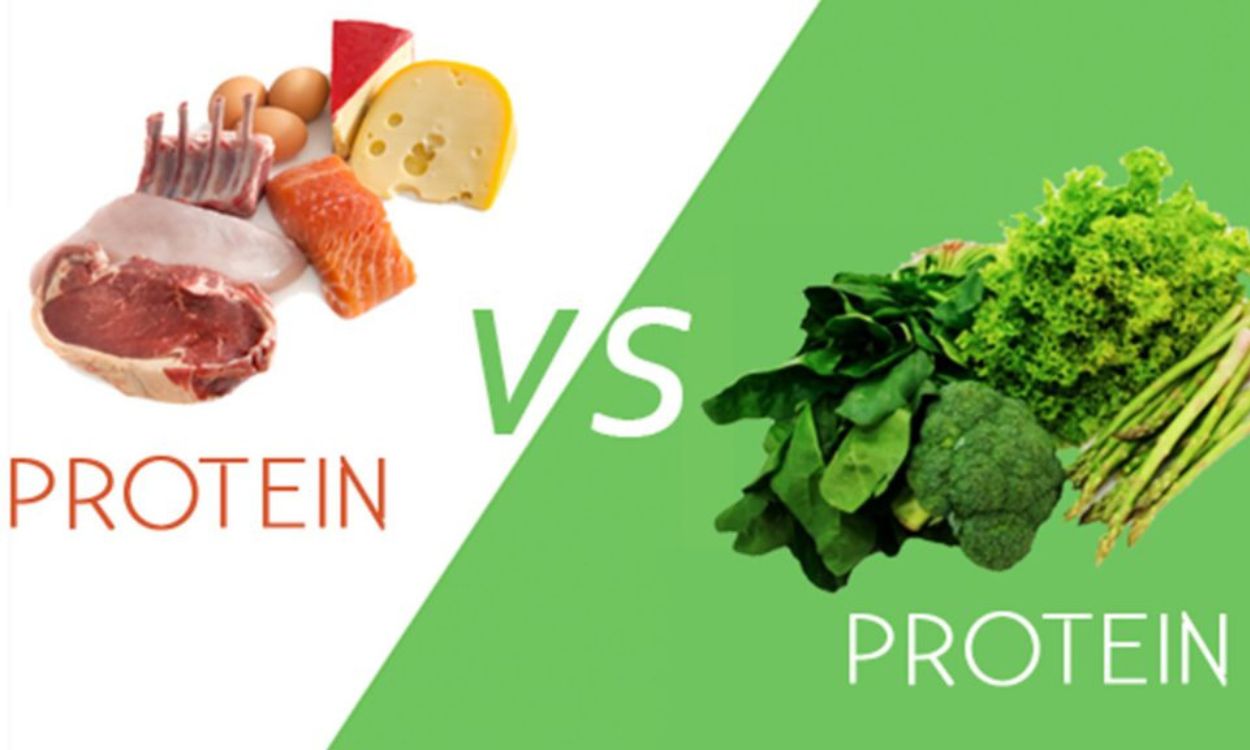Animal protein vs plant protein: Which one is better?
यह प्रश्न कि कौन सा अधिक अच्छा है, जानवरों का प्रोटीन या पौधों का प्रोटीन, विभिन्न कारकों पर निर्भर करता है, जैसे कि व्यक्तिगत स्वास्थ्य आवश्यकताओं, आहारिक पसंदों, और नैतिक विचारों। दोनों जानवरी और पौधों के प्रोटीन अनूठे पोषणीय लाभ प्रदान करते हैं:
जानवरों का प्रोटीन:
पूर्ण प्रोटीन: मांस, मुर्गे, मछली, अंडे, और डेयरी उत्पादों जैसे जानवरों के प्रोटीन स्रोत पूर्ण प्रोटीन माने जाते हैं क्योंकि वे सभी आवश्यक एमिनो एसिड प्रदान करते हैं जो शरीर को आवश्यक होते हैं।
उच्च जैविक मूल्य: जानवरी प्रोटीन उत्पादों का जैविक मूल्य अधिक होता है, यानि वे अधिक तेजी से अवशोषित और प्रयोग किया जाता है बनाया तुलनात्मक पौधों के अधिकांश प्रोटीन स्रोतों की तुलना में।
माइक्रोन्यूट्रिएंट्स में धनी: जानवरों के प्रोटीन अक्सर महत्वपूर्ण पोषक तत्वों के स्रोत होते हैं जैसे कि विटामिन बी12, लोहे, जिंक, और ओमेगा-3 फैटी एसिड्स।
पौधों का प्रोटीन:
फाइबर और फाइटोन्यूट्रिएंट्स में धनी: लेग्यूम्स, नट्स, सीड्स, टोफू, और टेम्पे जैसे पौधों के प्रोटीन स्रोत फाइबर, विटामिन, खनिज, और फाइटोन्यूट्रिएंट्स में धनी होते हैं।
संतृप्त वसा और कोलेस्ट्रॉल में कमी: पौधों के प्रोटीन में संतृप्त वसा और कोलेस्ट्रॉल ज्यादा होता है की तुलना में जानवरों के प्रोटीन स्रोत के।
पर्यावरणीय और नैतिक विचार: पौधों के प्रोटीन का उत्पादन जानवरों के उत्पादन की तुलना में और अधिक संतुलनशील और नैतिक माने जाते हैं।
अंततः, सर्वोत्तम प्रोटीन स्रोत व्यक्तिगत आहारिक पसंदों, स्वास्थ्य लक्ष्यों, और सामाजिक मूल्यों पर निर्भर करता है। एक संतुलित आहार जिसमें जानवरों और पौधों दोनों के प्रोटीन स्रोत शामिल हों, सामान्य स्वास्थ्य के लिए महत्वपूर्ण है। व्यक्तिगत आहारीक आदान-प्रदान को अपने आवश्यकताओं और पसंदों के अनुसार समायोजित करने में एक पंजीकृत पोषण विशेषज्ञ या स्वास्थ्य पेशेवर की सलाह लेना फायदेमंद हो सकता है।
The question of whether animal protein or plant protein is better depends on various factors, including individual health needs, dietary preferences, and ethical considerations. Both animal and plant proteins offer unique nutritional benefits:
Animal Protein:
Complete Protein: Animal protein sources such as meat, poultry, fish, eggs, and dairy products are considered complete proteins because they contain all the essential amino acids that the body needs. These amino acids are crucial for muscle repair, growth, and overall body function.
High Biological Value: Animal proteins generally have a higher biological value, meaning they are more readily absorbed and utilized by the body compared to most plant proteins. This can be beneficial for individuals who need to increase their protein intake or require high-quality protein for muscle building and repair.
Rich in Micronutrients: Animal proteins are often rich sources of essential nutrients like vitamin B12, iron, zinc, and omega-3 fatty acids, which may be more bioavailable compared to plant-based sources.
Plant Protein:
Rich in Fiber and Phytonutrients: Plant protein sources such as legumes, nuts, seeds, tofu, and tempeh are rich in fiber, vitamins, minerals, and phytonutrients. They also contain various antioxidants, which have been linked to reduced risk of chronic diseases like heart disease and certain cancers.
Lower in Saturated Fat and Cholesterol: Plant proteins are generally lower in saturated fat and cholesterol compared to many animal protein sources. Consuming a diet low in saturated fat and cholesterol may help reduce the risk of heart disease and improve overall cardiovascular health.
Environmental and Ethical Considerations: Plant-based proteins have a lower environmental footprint and are often considered more sustainable and ethical compared to animal agriculture. Choosing plant-based proteins may align with personal values related to animal welfare and environmental conservation.
Ultimately, the best source of protein depends on individual dietary preferences, health goals, and overall lifestyle. A balanced diet that includes a variety of protein sources from both animal and plant origins can help ensure adequate intake of essential nutrients while promoting overall health and well-being. It's essential to focus on the quality of protein sources and to incorporate a diverse range of foods to meet nutritional needs. Consulting with a registered dietitian or healthcare professional can help tailor dietary recommendations to individual needs and preferences.



0 Comments